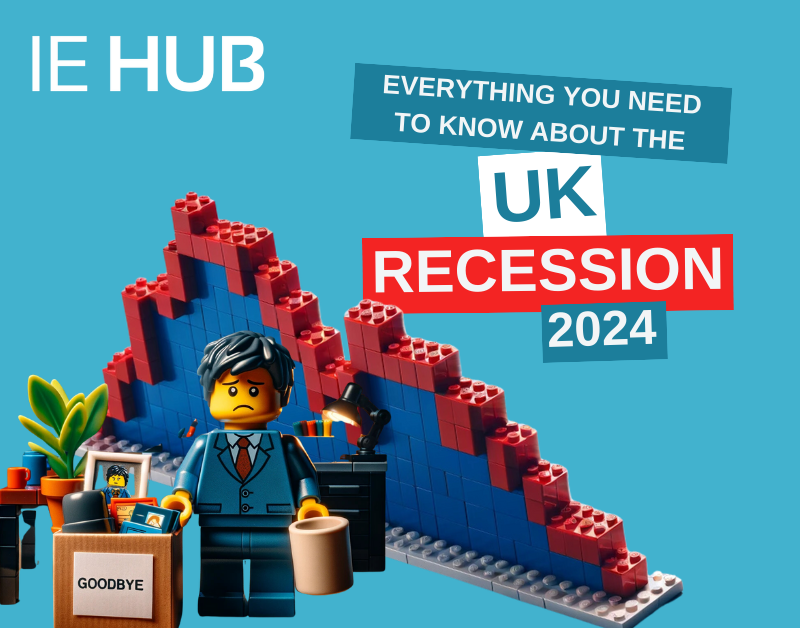
22 Feb
UK Recession of 2024: What You Need to Know
You might have heard about the UK economy going into something called a “recession.” But what does that really mean for you? In this article, we’re going to break down what it means; why it goes down; why we are in a recession in 2024 in the UK; and what it means for you. We’ll also share some tips on steps you can take to manage life during a recession. Let’s break it down:
What is a recession?
A recession is when a country’s economy isn’t doing well for a while. It happens when the total value of all the goods and services made in the country, known as the Gross Domestic Product (GDP), goes down for two quarters in a row (6 months).

Imagine the economy of a country as a giant jigsaw puzzle, with each piece representing a different part of how the country makes money. These pieces include things like people working, businesses selling products, and government spending on services such as education and healthcare.
Now, let’s focus on one specific piece of the puzzle: the GDP. Think of the GDP as a big scoreboard that keeps track of all the money made from selling goods and services within the country’s borders. When the GDP goes down, it means that overall, the country isn’t making as much money as it used to.
What causes the GDP to go down?
Well, there are a few factors at play:
- Reduced spending: Imagine if suddenly people stopped buying as many things as they used to. Maybe they’re they’re trying to save money or they cannot afford as much anymore. Whatever the reason, when people spend less, it means businesses make less money, which ultimately impacts the GDP.
- Decline in production: When businesses aren’t making as much money from selling their products, they might have to cut back on production. This could mean laying off workers or reducing the number of goods they produce. With fewer goods being made and sold, the overall value of the country’s production decreases, further impacting the GDP.
- Ripple effects: A decline in one part of the economy can have a domino effect on other sectors. For example, if people aren’t buying as many cars, it doesn’t just affect the car manufacturers—it also impacts the companies that supply the parts, the workers who transport the vehicles, and even the businesses that rely on car sales for their customers.
A real-life example
Meet Sarah. Sarah works at a local bakery, where she’s been employed for years. However, when the economy took a downturn, fewer people were coming into the bakery to buy their delicious pastries. As a result, the bakery had to reduce its hours and let go of some staff, including Sarah.

Sarah’s story highlights how a recession isn’t just about numbers on a graph—it’s about real people losing their jobs and struggling to make ends meet. And when enough people like Sarah are affected, it can have a big impact on the country’s overall economic health.
The difference between inflation and recession
Inflation and recession are two words often thrown around when people talk about the country’s money. However, they are two very different things.
Inflation happens when things get more expensive over time, so your money doesn’t buy as much as it used to. It’s like if the price of bread went up, and suddenly you couldn’t buy as much with the same amount of money.
Recession, on the other hand, is when the economy isn’t doing well. This means there are fewer jobs, and people are spending less money. So, while inflation is about prices going up, a recession is about the economy slowing down.
Why did the UK economy enter a recession in 2024?
In simple terms, the UK economy went into a recession at the end of 2023 because people like you and me started spending less money. No surprise, right? Have you seen the price of Lurpack? It would be cheaper to buy a cow and make it ourselves at this rate.
The prices of things we buy went up, and many of us couldn’t afford to buy as much stuff. This made businesses lose money, which then led to fewer jobs and more problems.
How does the 2024 UK recession affect you?
During a recession, the effects can trickle down to various aspects of our financial lives, including our bills. For instance, if you have a mortgage, you might find it challenging to keep up with payments if you experience a reduction in income or lose your job. Lenders may also tighten their lending criteria, making it harder to secure a mortgage or refinance an existing one.
Additionally, utility bills and other essential expenses may increase as businesses try to make up for their losses. It’s important to assess your financial situation carefully during a recession and explore various options with lenders to manage your bills effectively.
There are other ways that the recession can affect us:
- Spending less: You might have to spend less money on things that aren’t essential, like clothes or going out for dinner.
- Job worries: During a recession, some people might lose their jobs or have their work hours reduced. This can make it hard to pay bills and take care of your family.
- Money problems: If you already have debts or money worries, a recession can make things even tougher. Prices go up, but our wages might not, so it’s harder to make ends meet.
- Government help: The government often tries to help during a recession by making changes to things like taxes or interest rates. These changes are meant to help the economy get better.
What can you do during the UK recession in 2024?
If you’re concerned about your ability to manage future payments, creating an IE Hub account and sharing your financial situation with billing companies like energy providers and mortgage lenders can be a great step.
By doing so, these companies can get a clear picture of your current financial situation and work with you to create a plan that accommodates your needs. Whether it’s setting up a payment plan or exploring alternative arrangements, getting that ball rolling with your creditors can help take away some of the stress associated with financial uncertainty.
Even though times might be tough during a recession, there are many other things you can do to manage your money:
- Make a budget: Keep track of how much money you have coming in and going out. Try to spend less on things you don’t really need. If you want to see an overall picture of your money, head to IE Hub and use our free budget calculator.
- Save for emergencies: Try to save some money for unexpected expenses, like if your car breaks down or you need to see a doctor.
- Ask for help: Don’t be afraid to ask for help if you’re struggling with money. Some people and organisations can offer advice and support. IE Hub has a Help and Support Resource page within our customer portal. Simply create a free account and head to ‘Help and Support’ for advice and support with your situation.
- Stay informed: Keep up to date with what’s happening in the economy and how it might affect you. Knowing what’s going on can help you make better decisions about your money.
Remember, it’s okay to ask for help if you’re having a tough time. We’re all in this together, and there are people who want to help you through it.